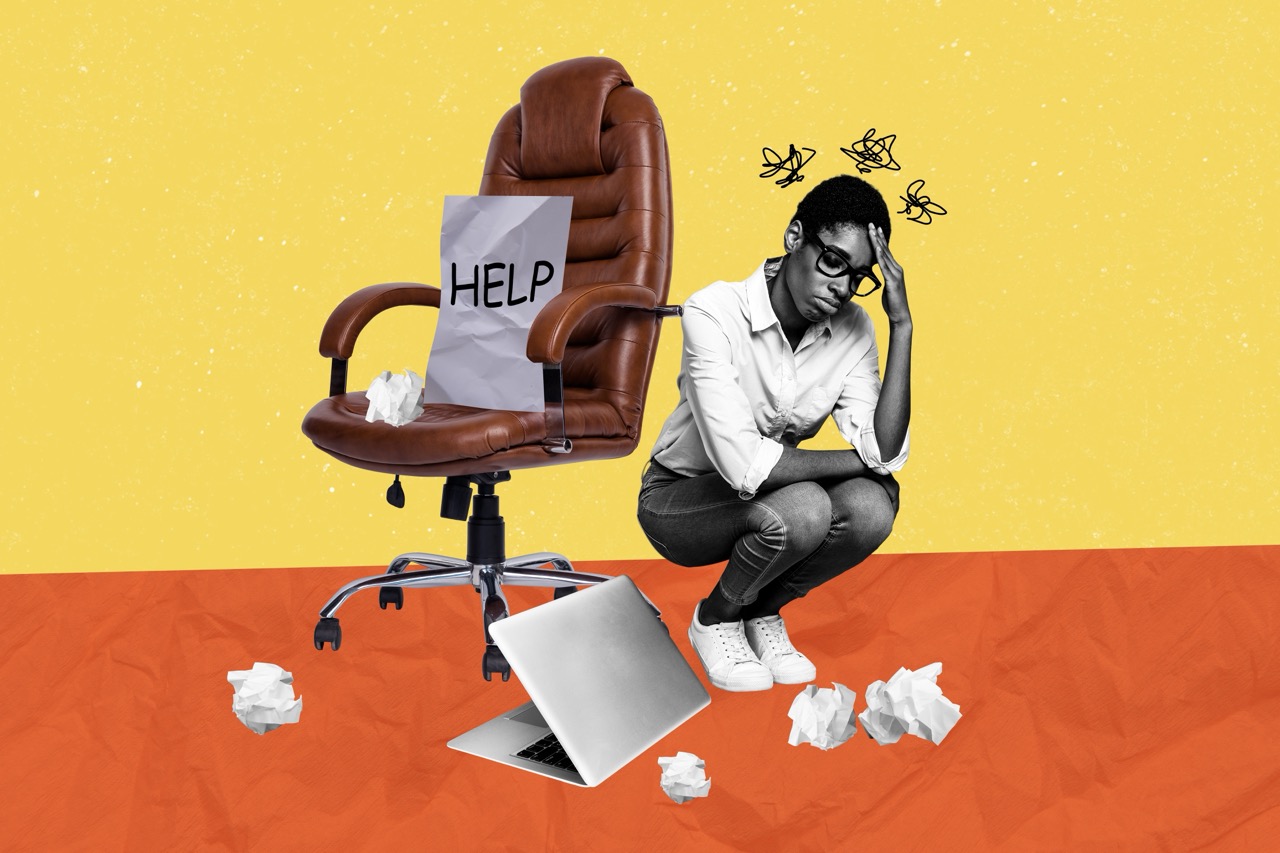The Four Stages of Burnout
Burnout is a gradual process that erodes mental, emotional, and physical well-being. It slowly wears down resilience and motivation, making even simple tasks feel overwhelming. Over time, it affects work performance, strains relationships, and makes fulfillment feel out of reach. Beyond exhaustion, it leads to a loss of confidence and detachment, deeply impacting overall quality of life.

The Weight of Burnout
Burnout is not a single event but a process that unfolds in stages. Recognizing these stages early can help prevent long-term damage. The four stages of burnout offer a framework to identify warning signs and take action before burnout becomes overwhelming.
Stage One: Exhaustion – The Warning Sign
Burnout does not happen overnight. It builds gradually, creeping in through physical, mental, and emotional exhaustion. [1] In the early stages, individuals push themselves to keep up with their workload, unaware of how prolonged stress is quietly wearing them down.
Tasks that once felt effortless now require immense effort. Simple responsibilities become obstacles, and the energy needed to get through the day feels increasingly out of reach. Evenings and weekends, meant for recovery, no longer provide real relief, leaving little time to recharge.
Instead of true rest, people turn to quick fixes like stress eating, binge-watching television, or mindlessly scrolling—anything to escape the fatigue. Sleep becomes disrupted, cognitive function declines, and irritability increases, making it harder to cope.
Despite these warning signs, many dismiss their exhaustion as temporary, believing they just need to push through. But endurance alone is not the answer. Ignoring burnout does not resolve it; it only deepens, paving the way for more serious consequences.
Signs you might be in this stage:
- The workday feels like a struggle. Tasks that once came easily now take twice the effort, leaving you drained before the day is over.
- Irritability and detachment take over. Small frustrations feel overwhelming, and interactions with colleagues or loved ones start to feel like a burden.
- You convince yourself to push through. Despite the exhaustion, you keep telling yourself that working harder will fix things, even as burnout worsens.
Tip: Prioritize rest early. Set boundaries, take breaks, and engage in activities that restore energy before exhaustion deepens.
Stage Two: Doubt and Shame
At this stage, self-doubt and imposter syndrome begin to take hold. What once felt like temporary fatigue deepens into a persistent sense of inadequacy.
Work that used to come easily now feels overwhelming. Simple tasks take longer as you second-guess every decision, worried that others might notice your struggles. The fear of underperformance makes new responsibilities feel daunting, increasing hesitation and self-doubt. [2]
Social interactions become more stressful. Instead of leaning on colleagues and peers for support, you withdraw, viewing conversations as sources of anxiety rather than reassurance. Even constructive feedback feels like criticism, reinforcing negative self-perceptions and chipping away at confidence.
Burnout at this stage is no longer just exhaustion—it begins to erode self-identity and decision-making abilities. Chronic fatigue, paired with declining self-confidence, leads to hesitation, avoidance of challenges, and the growing belief that your efforts no longer matter. Left unchecked, this mindset can spiral into deeper psychological distress, making recovery even more difficult.
Everyday signs of this stage:
- A once-easy project now fills you with dread. You overanalyze every detail, worried that mistakes will expose your shortcomings.
- A missed deadline feels like proof that you are failing. Instead of seeing it as a setback, you convince yourself it confirms your incompetence.
- You hesitate to speak up in meetings, doubting the value of your ideas. Where you once contributed freely, you now stay quiet, convinced that others are more capable.
Tip: Write down small accomplishments to shift focus from self-doubt, build confidence, and regain motivation.
Stage Three: Cynicism and Detachment
At this stage, burnout shifts from exhaustion and self-doubt to emotional detachment and cynicism. What may start as a way to cope with stress quickly becomes a barrier to meaningful engagement. The motivation and enthusiasm that once fueled productivity begin to fade, replaced by frustration and skepticism. Colleagues, clients, and even friends start to feel like obligations rather than sources of support. While productivity may continue at a functional level, the underlying sense of purpose disappears. Work and social interactions become increasingly transactional, with little emotional investment.
Burnout at this level extends beyond work performance, reshaping interpersonal relationships and weakening emotional resilience. [3] Detachment, initially a protective response to stress, gradually leads to isolation. Conversations feel forced, ambition dwindles, and personal connections suffer as emotional withdrawal takes hold. Over time, this growing disconnection can contribute to significant mental health challenges.
How cynicism and detachment impact mental health:
- Compassion Fatigue and Emotional Numbness – Caregivers and high-pressure professionals may become emotionally drained, leading to detachment and a loss of fulfillment in work and personal life.
- Depression and Persistent Loneliness – As cynicism grows, meaningful connections fade, increasing isolation and, in severe cases, depression, where social withdrawal deepens feelings of emptiness.
- Chronic Anxiety and Paranoia – Heightened distrust can make individuals see others as unreliable or expectations as unfair, fueling workplace anxiety, strained relationships, and, in extreme cases, paranoia.
Tip: Stay connected. Prioritize meaningful conversations, engage in purposeful activities, and focus on gratitude.
Stage Four: Breaking Point and Crisis
At this stage, burnout reaches its peak, leading to severe emotional, cognitive, and behavioral distress. Feelings of helplessness and despair take hold, creating a sense of being trapped with no clear way forward.
Decision-making becomes overwhelming as every option feels impossible. Physical symptoms, such as chronic headaches, digestive issues, and a weakened immune system, become more pronounced, further depleting energy and resilience. [4] Emotional responses swing between heightened irritability and complete numbness. In extreme cases, individuals may experience emotional breakdowns, severe anxiety, or depressive episodes.
This is the breaking point, where burnout is no longer just an internal struggle but a full-scale crisis. Intervention is critical. Seeking professional support, making workplace adjustments, or reassessing priorities becomes essential for recovery. Without action, burnout can have lasting consequences that go beyond work, affecting overall mental health, relationships, and personal well-being.
Real-world signs of a breaking point:
- A once-driven professional suddenly disengages – Someone who thrived on productivity now avoids responsibilities, misses deadlines, or simply goes through the motions.
- An individual isolates from friends and family – Conversations feel exhausting, and social interactions are avoided altogether, reinforcing loneliness and detachment.
- Emotional outbursts or complete shutdowns become common – Small frustrations trigger intense reactions, or emotions become completely blunted, making it difficult to express or process feelings.
Tip: Recognize burnout early, set boundaries, prioritize rest, and seek support to prevent a full-scale collapse.
The Breaking Point and the Path Forward
Burnout often forces a turning point, a recognition that the current pace is no longer sustainable. While this realization can be difficult, it also creates an opportunity for renewal. Many hesitate to seek help, believing that self-reliance is a sign of strength. [5] In reality, resilience comes from knowing when to pause, reassess, and seek support.
Recovery is not about stepping away from responsibility but about making intentional choices that restore balance and meaning. Prioritizing well-being does not mean sacrificing ambition, it means creating a foundation for sustainable success.
Moving forward requires setting healthier boundaries, embracing self-care that truly replenishes, and fostering an environment where balance is not just encouraged but essential. The choice is clear. Recognize burnout as a signal for change and take steps toward a more fulfilling life, or continue down a path that leads to deeper exhaustion.
- “Breaking Down Burnout in the Workplace.” Mayo Clinic Press, 6 Apr. 2023, https://mcpress.mayoclinic.org/mental-health/breaking-down-burnout-in-the-workplace/. Accessed 10 Feb. 2025.
- Kim, Sang-Woo, et al. “Association Between Job-Related Factors and Work-Related Anxiety, and Moderating Effect of Decision-Making Authority in Korean Wageworkers: A Cross-Sectional Study.” BMC Public Health, vol. 21, 2021, Article 1182. PubMed Central, https://pmc.ncbi.nlm.nih.gov/articles/PMC8197820/. Accessed 10 Feb. 2025.
- Ong, Anthony D., C. S. Bergeman, Toni L. Bisconti, and Kimberly A. Wallace. “Psychological Resilience, Positive Emotions, and Successful Adaptation to Stress in Later Life.” Journal of Personality and Social Psychology, vol. 91, no. 4, 2006, pp. 730–749. PubMed, https://pubmed.ncbi.nlm.nih.gov/17014296/. Accessed 10 Feb. 2025.
- Oroian, Bianca Augusta, et al. “New Metabolic, Digestive, and Oxidative Stress-Related Manifestations Associated with Posttraumatic Stress Disorder.” Frontiers in Neuroscience, vol. 14, 2020, Article 8712172. PubMed Central, https://pmc.ncbi.nlm.nih.gov/articles/PMC8712172/. Accessed 10 Feb. 2025.
- Meadley, Abigail, Debra Rickwood, and Amelia Ishikawa. “Young Adults’ Perceptions of the Role of Self-Reliance and Trust on Help Seeking for Mental Health Problems.” Youth, vol. 4, no. 4, 2024, pp. 1726–1738. MDPI, https://doi.org/10.3390/youth4040109. Accessed 10 Feb. 2025.
The Clinical Affairs Team at MentalHealth.com is a dedicated group of medical professionals with diverse and extensive clinical experience. They actively contribute to the development of content, products, and services, and meticulously review all medical material before publication to ensure accuracy and alignment with current research and conversations in mental health. For more information, please visit the Editorial Policy.
We are a health technology company that guides people toward self-understanding and connection. The platform provides reliable resources, accessible services, and nurturing communities. Its purpose is to educate, support, and empower people in their pursuit of well-being.
Mark Gorkin, MSW, LICSW, also known as "The Stress Doc," is a nationally recognized webinar expert, published author, and speaker.
Jesse Hanson, Ph.D., is a somatic psychologist with more than 20 years of experience in clinical psychology and neuropsychology.
The Clinical Affairs Team at MentalHealth.com is a dedicated group of medical professionals with diverse and extensive clinical experience. They actively contribute to the development of content, products, and services, and meticulously review all medical material before publication to ensure accuracy and alignment with current research and conversations in mental health. For more information, please visit the Editorial Policy.
We are a health technology company that guides people toward self-understanding and connection. The platform provides reliable resources, accessible services, and nurturing communities. Its purpose is to educate, support, and empower people in their pursuit of well-being.


